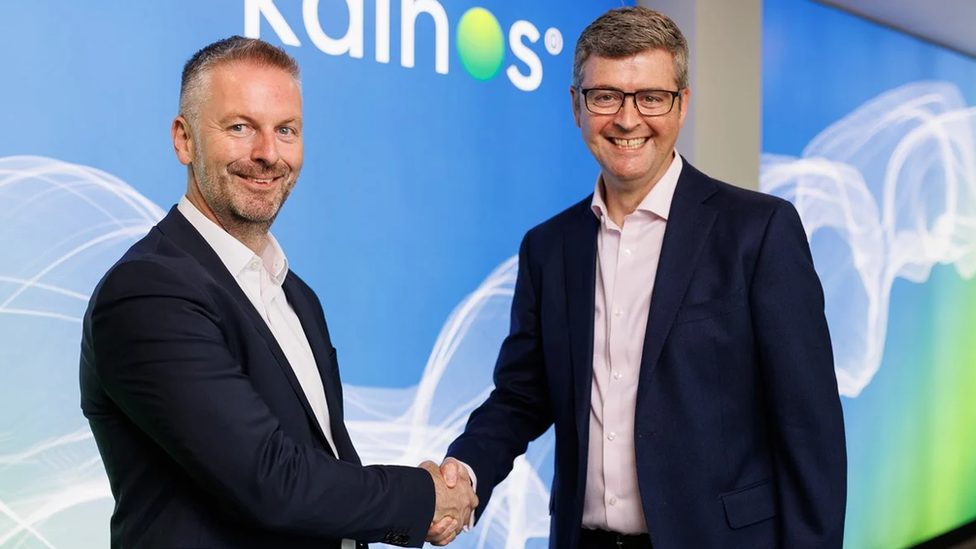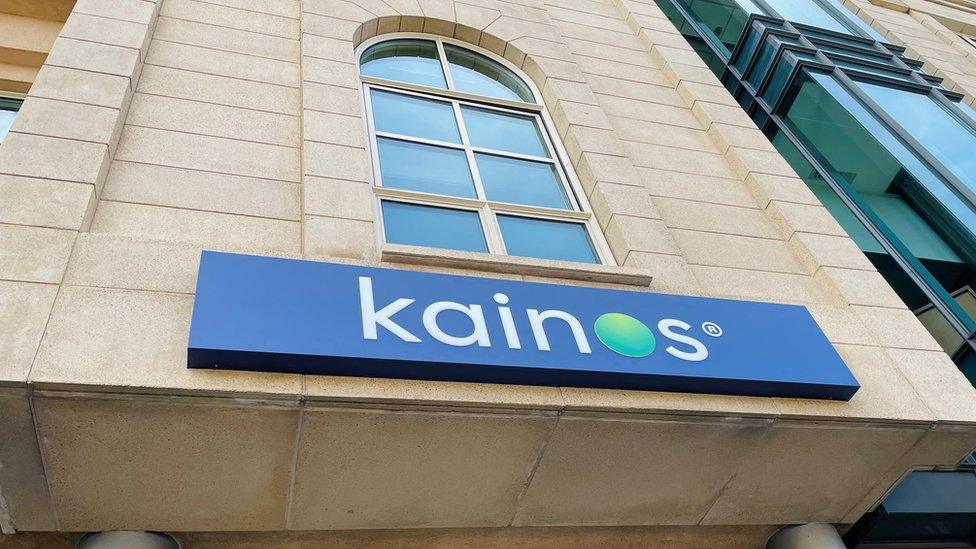Kainos: Russell Sloan takes top job at one of NI's biggest firms
- Published

New Kainos boss Russell Sloan (left) started his new role earlier this week
Russell Sloan is not a household name, but this week he started one of the biggest jobs in Northern Ireland.
He has taken over as chief executive of Kainos, the IT company which is the largest of Northern Ireland's handful of stock market listed companies.
It has a current valuation of more than £1.5bn and employs about 3,000 people - a third of them in Northern Ireland.
Next week, its plans for a new HQ in Belfast will go out to public consultation.
The HQ plans have been scaled back from the original pre-pandemic vision as the rise of home working means the company does not need as big an office as originally planned.
The new building will still represent an investment of up to £30m, but Mr Sloan says there is no plan to change the current policy which allows people to work from home as much as they want.
"We have not mandated a number of days a week people should be in the office," he tells BBC News NI.
"We're finding that midweek teams are coming in because they want to be working together - we organise some events but teams tend to self-organise."

Kainos specialises in helping organisations to digitise their operations
This year, the business has returned to running its graduate engineering academies in-person across all its locations.
"Particularly at the early stage of your career, it is hard to get a substitute for some in-person learning, speaking to whoever is teaching you and your peers," the new Kainos boss adds.
Staff numbers double
Mr Sloan started at the business in 1999 as a trainee software engineer having graduated in electrical engineering.
Before taking the top job, he ran the company's Digital Services division, leading the teams that work on digital transformation projects for government, healthcare and commercial sector organisations.
The company will take on about 200 graduates this year, continuing a steady increase in staff numbers with a headcount that has effectively doubled since 2019.
That demand for skilled staff in recent years has meant employers have had to compete with higher wages, particularly as remote working has made it much easier for workers to switch jobs.
The Kainos annual report suggests median pay for its UK employees last year was £55,000, up almost 10% compared to 2021.
But Mr Sloan says that red hot jobs market has cooled off as the economy has slowed.
"Post-Covid we had a spike in the market. It was very competitive to get good talent - that's cooled quite considerably in the last number of months.
"People have been a bit more reluctant to move around. We're seeing our own attrition levels back down to single digits.
"I think if you look right across the industry, there's an element of caution in the market, particularly commercial sector organisations. It's not that projects are going away but they are being delayed a little bit or reduced in size."
International goals
Kainos's biggest client has traditionally been the UK government, with projects including the NHS England app and the online passport renewal service.
Under Mr Sloan's predecessor Brendan Mooney, a major plank of the company's strategy had been to diversify and internationalise its client base.
That push will continue and one aim is to win major government business in other countries with Canada as the number one target.
Mr Sloan says it has similar government structures to UK and a digitisation strategy which is about five or six years behind the UK.
"It's still early days, but the playbook is telling the same story that we've already delivered in the UK. We've got a number of small pieces under way."
Perhaps surprisingly, Kainos does not generally bid for public service contracts in Northern Ireland, with Mr Sloan saying it's easier to do business with central government.
That means the company is not directly exposed to Stormont's budget difficulties but he says it still has implications, not just for his business but the wider economy.
"The big consideration is skills, the skills coming through school leavers into the universities," he said.
"If there is any impact on education budgets, it has an impact ultimately on industry."
Related topics
- Published29 August 2023

- Published19 June 2023

- Published22 May 2023
